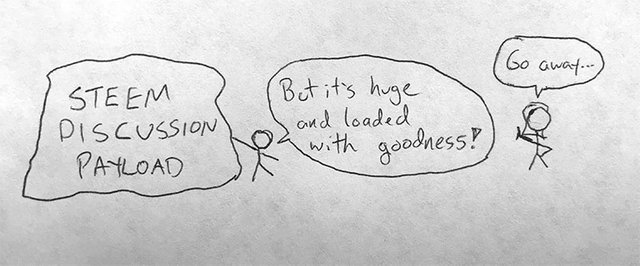Steem API Basics - Part 1: Parsing Post Payloads with Ruby
The Steem API returns a data payload for posts that is big, long, and hard to handle. I'm here to help you master this data in order to make the most out of Steem.
Understanding the post payload can be a lot to take in at once, so, as part of the @steemsmarter ongoing effort of Making Sense Of Steem, I'm breaking this post into a five-part series that will go deep into how we can dominate the data that we receive from this API endpoint.
Where we last left off
In my previous post, we looked at finding posts published in a time range from the Steem blockchain, during which I used Ruby on Rails and the awesome Radiator gem from @inertia to create a a lib service class named SteemPostFinder. This new class let us run queries such as:
SteemPostFinder.new('crypto').posts_in_time_range('2018-02-14','2018-02-15')
This query returns an array of Discussion payloads hashes pulled directly from the blockchain via the Steem API. Sweet! We now have a huge package of Discussion payloads... but what good is this if we don't know how to handle a single payload?
Here we go again
If you haven't seen my previous post, you should probably check it out. It's pretty awesome in my super non-biased opinion.
We're going to be building on top of the SteemPostFinder class from that post to add some easy ways to grab individual posts so that we can probe their inner workings. Either way, it will probably help you to review the gist of the previous post's final results to get the most of this post.
Parsing a single payload
We're going to use @inertia's Radiator gem to grab the payload for a single discussion from the Steem API. I'm wrapping it in a new Rails method so we can resuse this logic in our SteemPostFinder class (see the updated gist):
def get_post(author, permlink)
params = { tag: @tag_name, limit: 1, start_author: author, start_permlink: permlink }
response = api.get_discussions_by_created(params)
response.blank? ? [] : response['result'].try(:first).try(:with_indifferent_access)
end
From here we can use our SteemPostFinder class to get the post payload for any discussion
post = SteemPostFinder.new('steem').get_post('thescubageek','steemsmarter-finding-daily-posts-with-ruby')
At this point we have a post variable containing the payload from the Steem API for a single post. It's a huge payload, but I bet you can handle it. Let's go a little deeper.
Disclaimer
I refer to posts in a loose sense in this article, but what I'm really talking about is considered to be discussions under the hood. A discussion is a parent object that includes both posts and comments, both of which are really instances of discussions at the end of the day.
Confused? No worries -- it is confusing -- and this will be covered in a future article.
The Payload
Here's an example of the mess that a single payload dumps on us:


Nasty eh? Quite a lot to swallow at once... for today, let's get a feel of most important fields: author and permlink.
Author and Permlink
author and permlink are the two unique key-pairs upon which all discussions (posts + comments) are referenced. There can only be exactly one pair of author/permlink in the entire Steem blockchain.
For posts, the permlink defaults to the dasherized title of the article. For example, "SteemSmarter: Finding Daily Posts with Ruby" becomes steemsmarter-finding-daily-posts-with-ruby.
For comments, the permlink is the same as the parent post/comment, except that the permlink is:
- Prefixed with
re-followed by the parent posts/comment's author, iere-thescubageek- - Suffixed with the the timestamp of the comment, ie
-20180226t231257609z
For example, a reply to the post above may look like:re-thescubageek-steemsmarter-finding-daily-posts-with-ruby-20180226t231257609z
author and permlink payload parameters are significant for:
- Looking up an individual discussion on the Steem blockchain
- Referencing a starting point for recursive time-range API lookups (see my last post)
- Identifying parent/child relationships in the post/comment hierarchy (more on this later in a future post)
The gist is this: if you don't know the author and permlink for a discussion, you're gonna have a bad time.
What's Next?
In my next post, we will pick up by probing deeper into the the parameters related to content, author profile, and post metadata in the discussion payload.
If you find this post helpful please resteem and upvote, and remember to follow @thescubageek and @steemsmarter to stay on top of our latest Steem projects.
Until next time, keep on Steemin' Steemians!



Thanks, very good post !!!!
Awesome Work!

Keep it up!!!
@cryptoinvestinfo
Thanks! More to come very soon!
Talk about specific, say, Steemit is logging exact time/space of post content into metadata?
What would happen in 10, 20 years, impermeable digital history? Incredible the amount of information here, could Steemit model the Unsinkable Library of Alexandra?
Like a friend and I say, to the future, BLOCKCHAIN IT!
Put it on the blockchain indeed! Having public access to this timestamp data gives an awesome layer of transparency into the platform -- everyone knows when a change has been made.
There's an incredible amount of data here when you start cross-referencing all the information -- financial trends, account engagement, whale activity, etc. The @steemsmarter project has a lot of cool stuff in development around these areas and I look forward to sharing it with the Steem community soon.
If it hasn't been overstated at this point, mining cryptocurrency to mitigate large data crunching operations is a no-brainer passive income stream. While servers are calculating huge metric data, of populations, migration patterns, analyzing genetic anomalies, the movement of celestial bodies over great amounts of time, why not have solutions-driven protocols mine token coin rewards to the hundreds of scientists, writers, and technicians inputting their studies towards funding the project with the research itself?
Of course, healthcare and medical information systems come to mind. Mining operations can retail their server processing power (STEEM power delegation) to a billing processor or file archive (Steem Dollar Token), to encrypt patient data inputs to a remote storage, and patient authorizes inputs with biometric private key access. I can't help but figure that capitalism/consumerism would be replaced with kind of gamified techno-conservatism aimed at energy efficiency in every factor.
Hospitals can interpolate patient biometric information without having to actually handle the data because as metric is inputted into the system, it is encrypted into passive submissions to a blockchain accessible by smart contract based, self-executing applications. Patients live their lives and doctors (rather A.I) can intelligently advise based on instantaneous access to real-time information from anywhere in the world.
Stop me if I'm getting ahead of myself, but maybe this is the future already? I'm ready!
Time is Art. In Life, all we have is Time. Why not make Art all the Time?
I am a proud @earthnation Steemit Guild Community member!
Thanks to their loyal support, I am able to create a passive income stream that funds my creative output and delivers this original content directly to YOU.
This is really great. You actually broke it down. But i still don't fully understand what perm link is.
One other cool trick... you can find the author/permlink for any comment in Steemit by inspecting the HTML for that comment in your browser. In Chrome, right click the comment, then click Inspect. You should be near a piece of HTML that has an
idcontaining theauthor/permlinkPermlink is what shows up in the URL when you go to a post -- it is the permanent link to that post. In this case of this post:
author: @thescubageekpermlink: steem-api-basics-part-1-parsing-post-payloads-with-rubyAll comments also have permlinks, which are generated according to the rules as I describe in the post above. Your comment, for example, has the following parameters:
author: @augustinanwekepermlink: re-thescubageek-steem-api-basics-part-1-parsing-post-payloads-with-ruby-20180301t024812479zThe cool this is that we can also use the
get_postmethod I wrote above to get information about individual comments (and comment trees!), not just posts.In an upcoming post I'll go into more detail on how the post / comment hierarchy works and how we can grab this data from the API payload.
I hope this helps @augustinanweke...
Great write-up @thescubageek. This is the type of transparency that (i hope) will garner trust in our @steemsmarter project. Upvoted and resteemed! And look! @lukestokes made an appearance in the code.